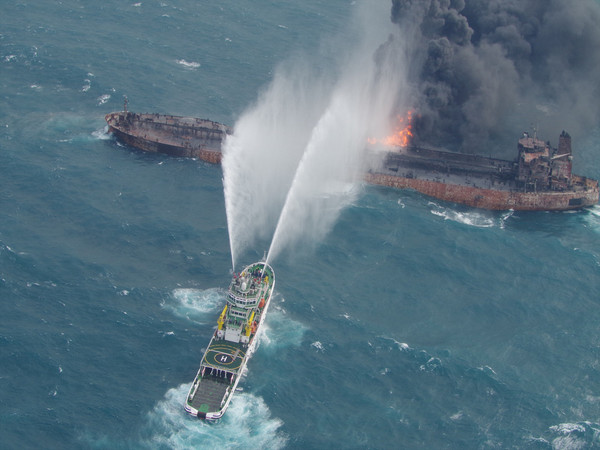Media Report

- The New York Times reports: "The pace of growth in China's economy accelerated last year for the first time in seven years as exports, construction and consumer spending all climbed strongly. At least, that's what the government says. In reality, the pace of growth in China's economy is anybody's guess. Various signals suggest China's growth did speed up last year, which could give the government the room it needs to tackle an accumulation of serious financial, environmental and social problems this year. But measuring the size and health of the world's second-largest economy can be difficult at best. Its official figures have become implausibly smooth and steady, even as other countries post results with plenty of peaks and valleys. Officials in far-flung regions are admitting their numbers are wrong... The National Bureau of Statistics announced on Thursday that the economy expanded 6.9 percent last year, up slightly from 6.7 percent in 2016 and breaking a trend of gradual slowing that began in 2011. For the fourth quarter, the bureau reported economic growth of 6.8 percent over a year earlier. Strength in exports, retail sales and the property market has helped spur growth, putting China in a better position to tackle problems including a sharp climb in debt, severe pollution and other problems."
- CNN reports: "An oil spill from an Iranian oil tanker that sank in the East China Sea is now the size of Paris. The slick covers an area of 101 square kilometers (39 square miles), after almost doubling in size from the start of the week, according to figures released Wednesday by the Chinese State Oceanic Administration. Chinese authorities said there were four separate slicks that had formed after the Panama-registered Sanchi tanker sank Sunday. The largest oil slick is 48 square kilometers (19 square miles), it added. The Administration did not respond for a request for additional information Thursday. It had been burning in the East China Sea for a week following a collision with another vessel. All crew members, 30 from Iran and two from Bangladesh, are presumed dead."
- The Guardian comments: "The arrest of a former CIA agent this week is the stuff of a classic murky spy tale. Though he is charged with unlawfully retaining national defence information, the US reportedly suspects that he leaked the names of informants. An earlier report alleged that China imprisoned or killed multiple US sources between 2010 and 2012. Both countries have plans for tackling espionage. But analysts, intelligence agencies and politicians are now debating how to handle the subtler challenge of Chinese influence activities: a "magic weapon" neither cloak-and-dagger nor transparent. China says it does not interfere in other countries' domestic affairs. Yet all nations seek to sway foreign governments and citizens towards their own priorities, interests and perspectives. The question is how they do so, and how far they go. (No one should pretend that western nations always act above board.) China's influence work is strategic and multifaceted. Some of it is distinctive mainly for lavish resourcing. The National Endowment for Democracy recently described other aspects as 'sharp power': the effort by authoritarian states not just to attract support but to determine and control attitudes abroad. It seeks to "guide" the diaspora and enlist it for political activity. It embraces foreigners, appointing those with political influence to high-profile roles in Chinese companies. Chinese-language media overseas have been bought by entrepreneurs with ties to Beijing. Partnerships with universities shape research and limit debate."
Calendar
- 2018-01-17 Ex-C.I.A. Officer Suspected of Compromising Chinese Informants Is Arrested
- 2018-01-16 China fake data mask economic rebound
- 2018-01-15 US Plans New Nuclear Weapons
- 2018-01-14 Global investors lick lips as China opens to asset firms
- 2018-01-12 Marriott to China: We Do Not Support Separatists
- 2018-01-11 Chinese media warns the US of 'retaliations' from 'all sides' after new Taiwan bills passed
- 2018-01-10 Inside the growing backlash against China
- 2018-01-09 China's Strategy to Psych Out the West Is Paying Off
- 2018-01-08 Trump is reportedly targeting China in aggressive trade crackdown
- 2018-01-07 Continued Strong Government Expected In China's Economy This Year
News
- The New York Times China's Economic Growth Looks Strong. Maybe Too Strong.
- CNN Oil tanker Sanchi partially explodes in East China Sea
- Fox News Officials fear China compromised US covert communications, report says
- Quartz Tensions between the US and China are spreading to news. Or is it fake news?
- The New York Times Souring World Views of Trump Open Doors for China and Russia
- Financial Times First Chinese takeover of US group under Trump gets go-ahead
- The Washington Post China asked Marriott to shut down its website. The company complied.
- The New York Times India Tests Ballistic Missile, Posing New Threat to China
- CNBC 2017 marked a turning point for capital flows, China currency regulator says
- The New York Times Hunting a C.I.A. Mole, Agents Gambled and Let a Suspect Return to China
- NPR China Reports Its Fastest Economic Growth In 7 Years
- The Guardian China testing facial-recognition surveillance system in Xinjiang – report
- CNBC Google is missing out on billions of dollars by not having an app store in China, new data shows
Commentary
- The Guardian The Guardian view on China's spreading influence: look in the gift horse's mouth
- CFR A Few Words on China's Holdings of U.S. Bonds
- U.S. News & World Report What to Expect from China's Economy in 2018
- Forbes This Week In China Tech: More Crypto Crackdown And Rise Of Silicon Valley Sea Turtles
- Fortune This Is How China Is Stifling Bitcoin and Cryptocurrencies
- Financial Times China bulls should be worried their view is now the consensus
- Bloomberg China's Real Offshore Disaster